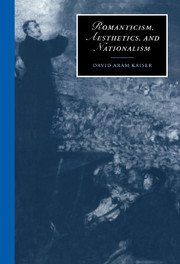Book contents
- Frontmatter
- Contents
- Acknowledgements
- List of abbreviations
- Introduction
- 1 Modernity, subjectivity, liberalism, and nationalism
- 2 The symbol and the aesthetic sphere
- 3 Schiller's aesthetic state
- 4 Symbol, state, and Clerisy: the aesthetic politics of Coleridge
- 5 The best self and the private self: Matthew Arnold on culture and the state
- 6 Aesthetic kingship and queenship: Ruskin on the state and the home
- 7 The aesthetic and political spheres in contemporary theory: Adorno and Habermas
- Notes
- Index
5 - The best self and the private self: Matthew Arnold on culture and the state
Published online by Cambridge University Press: 22 September 2009
- Frontmatter
- Contents
- Acknowledgements
- List of abbreviations
- Introduction
- 1 Modernity, subjectivity, liberalism, and nationalism
- 2 The symbol and the aesthetic sphere
- 3 Schiller's aesthetic state
- 4 Symbol, state, and Clerisy: the aesthetic politics of Coleridge
- 5 The best self and the private self: Matthew Arnold on culture and the state
- 6 Aesthetic kingship and queenship: Ruskin on the state and the home
- 7 The aesthetic and political spheres in contemporary theory: Adorno and Habermas
- Notes
- Index
Summary
ARNOLD AND COMMON CULTURE
I will make the case for connecting Matthew Arnold with the aesthetic statism of Schiller and Coleridge, but it is important to note that Arnold is often placed in another line, the line of culturally conservative criticism of T. S. Eliot and F. R. Leavis. This is the critical line of descent described by Chris Baldick, in The Social Mission of English Criticism, 1848–1932, and Baldick argues that what is central to this line is its rejection of theory. Comparing Eliot to Arnold, Baldick writes: “In Eliot's writings there is the same impatience with controversy: his ideal society would change unconsciously without theory or polemic”. It is on the issue of being opposed to theory that Baldick distinguishes Arnold from Coleridge: “For the notoriously ‘theoretical’ Coleridge, practical criticism was a procedure subordinate to critical theory and to philosophy, not antithetical to them. At the very heart of Arnold's major innovations in English criticism is his reversal of Coleridge's position on this point. For him, literary criticism becomes an alternative to philosophy, logic, and theory” (232). In many ways, I agree with Baldick's criticisms of Arnold's antitheoretical side, as will be evident in my own criticisms of Arnold's account of the literary touchstones, but Baldick's account ignores the considerable similarities and continuities between Coleridge and Arnold in their projects of aesthetic statism.
- Type
- Chapter
- Information
- Romanticism, Aesthetics, and Nationalism , pp. 74 - 91Publisher: Cambridge University PressPrint publication year: 1999



